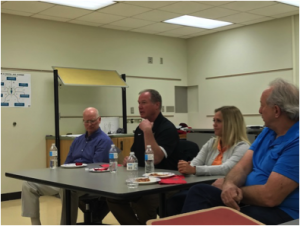The frequent reports of gun shootings in communities and especially in schools, leave us in disbelief. The media’s portrayal of the scenes impacts our perceptions and attitudes about teaching. As a professor of early childhood education, this horrific news makes it challenging to teach an Introduction to Early Childhood course that is intended to welcome and convince students about the joys that come with teaching.
 Despite the negativity around the teaching profession, I believe there is one appealing aspect of teaching that continues to support teachers. The camaraderie that teachers create among themselves sustains teachers even amid times of doubt. Throughout my years in education, I have felt affirmed and supported when surrounded by colleagues who share similar interests and views about children. There is certainly something to say about the power of the profession! We continually witness the power and strength of teachers who put their lives on the line for their students. Viewing the most recent news regarding teacher strikes, we are asked to stand behind teachers who are fighting for a better education system that includes adequate wages and supplies for students. As we continue to build camaraderie with our colleagues near and far, we see that there is strength in numbers.
Despite the negativity around the teaching profession, I believe there is one appealing aspect of teaching that continues to support teachers. The camaraderie that teachers create among themselves sustains teachers even amid times of doubt. Throughout my years in education, I have felt affirmed and supported when surrounded by colleagues who share similar interests and views about children. There is certainly something to say about the power of the profession! We continually witness the power and strength of teachers who put their lives on the line for their students. Viewing the most recent news regarding teacher strikes, we are asked to stand behind teachers who are fighting for a better education system that includes adequate wages and supplies for students. As we continue to build camaraderie with our colleagues near and far, we see that there is strength in numbers.
As a professor in the education system I recognize that my efforts alone cannot be sufficient in supporting students who choose education. Connectedness within the profession is crucial for all of us as we choose to remain in the profession. Consequently, I have made a concentrated effort to link students with educators who willingly serve as a support system to them. In fact, reflecting on my own career path, my successes can be attributed to one of my undergraduate professor who has been my greatest advocate and supporter, even now, as she turns 88 years of age.
Students in the Introduction to Early Childhood Education class were recently given the assignment of interviewing a teacher. The main goal was to connect the students to teachers in the field. The students were given the freedom to choose their own teacher. I was intrigued that many of them chose former teachers whom they felt a connection with. During the interview students asked prepared questions that fell under various themes. The themes most frequently chosen by students were related to classroom management, curriculum, and professionalism. Advice given to the students focused around the aspect of professionalism and the relevance of building camaraderie among colleagues.
In my work with the Men in Education group, I have had the honor and privilege of working with many male educators working with young children in the field. These seasoned teachers are more than eager to mentor and guide these future teachers. Sadly, due to time constraints and schedules, my students are not able to take advantage of this opportunity to meet these teachers in their classrooms. Thus, we strive to utilize the monthly meetings to host speakers.
During our scheduled April meeting we were fortunate to have the father and 3rd grade teacher of one of our newest early childhood students travel from Eden Prairie Minnesota to meet with the Men’s group. John also brought with him his ‘team’ of colleagues who together have over 35 years teaching experience. Twelve of our future teachers met with this group of educators for the evening. The panel discussion provided time for these teaching scholars to talk about their lives as teachers and colleagues as well as answer questions from the students. The questions included ways to deal with parents, teaching techniques using technology in their classrooms, student behavior issues and the experience of student teaching.
What fascinated me was the camaraderie among these third-grade teachers. They spoke with passion about working together to create engaging activities for third graders and shared examples of how they supported each other as teachers. These scholars explained ways they studied new curriculum and collaborated to create new ideas and strategies for teaching. Each of the panel members gave suggestions to the students about how to be successful in the field.
The advice included four crucial points:
1) Attitude; show up to everything with a positive attitude;
2) Be prepared;
3) Let things roll off your back, and;
4) Follow your passion.
The presentation from these teachers was solid evidence of the power of the profession that creates a support system for the future men and women in early education.
I am so proud to be a part of this endeavor.

